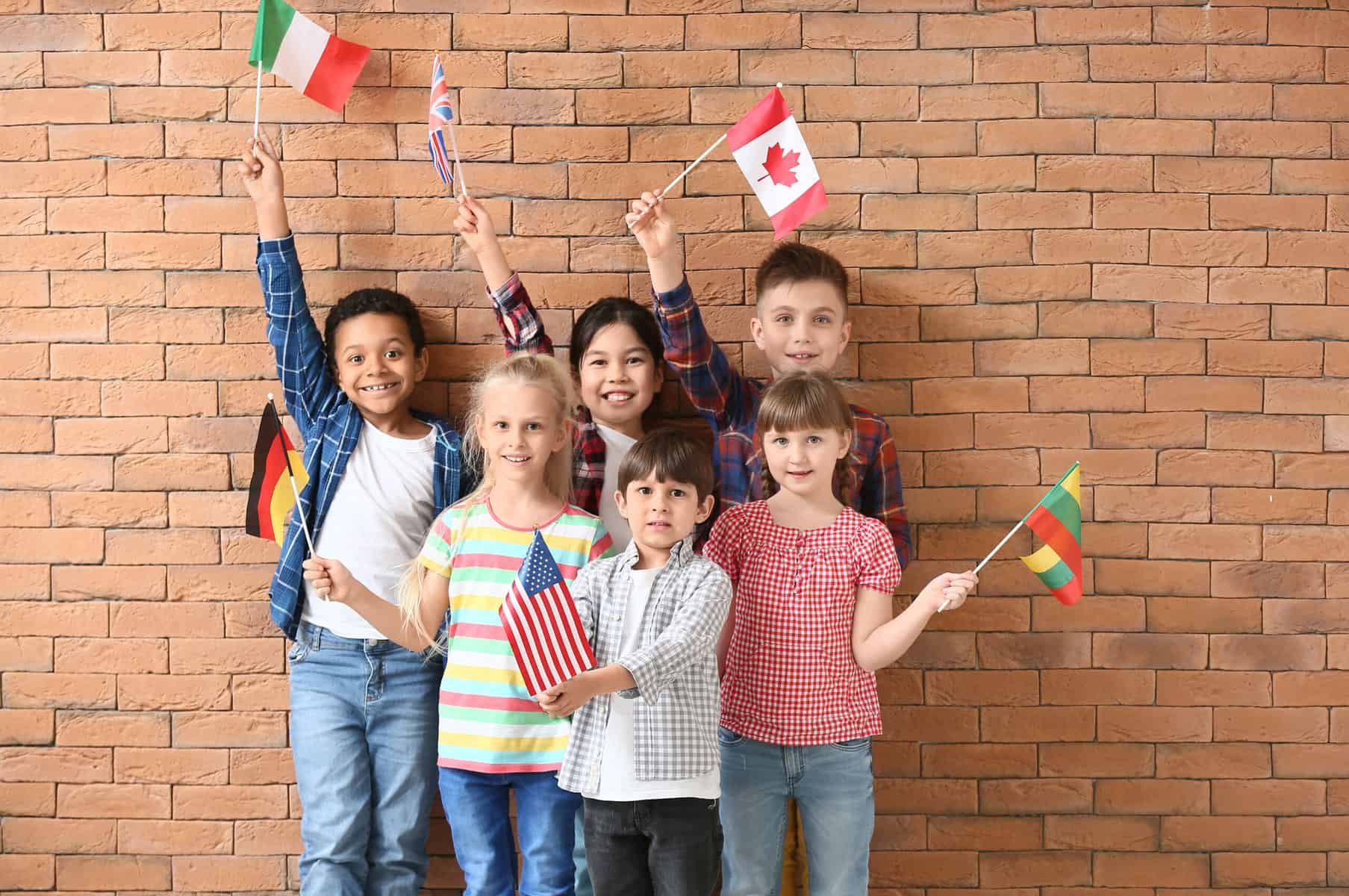Online Social Studies Curriculum for Elementary Students
The best homeschool social studies curriculum should help students create connections between learning topics. Students need to learn place names, their cultures, their natural resources, their geographical features, their governments, and more to see the complexities of their world. There are variables in how and when they learn certain details, but they all have importance to the bigger picture.
Our Homeschool Social Studies Curriculum
Students learning about social studies in elementary education benefit greatly from having the background knowledge to form new ideas and connections throughout their social studies education. When choosing an elementary social studies curriculum, make sure it meets your needs. Our accredited homeschool curriculum aims to provide the right ingredients for a well-rounded education. Social studies topics for elementary students should include:
- Social and interpersonal skills (particularly for younger children)
- Map reading
- Culture exploration
- Practice with country, state, capital, and landmark names
- Features of the natural environment
- Exposure to the processes of different governments
- An introduction to regional and global economics
- United States and world history

Early Elementary Social Studies (Grades K-3)
Our early elementary social studies curriculum teaches foundational knowledge in history, geography, and civics that students can integrate into their future education. Lessons include the names and locations of places, the aspects of good citizenship, and the important community roles that people play. These building blocks let students make deeper connections in their later learning.
Beginning Social Studies 1: REVISED 2023
K-1st Grade
Young children often learn best using games and songs that help them remember names and places. Additionally, dialogue and stories between fun and interesting characters teach feelings, manners, and empathy, which are valuable for social development and interpersonal skills. Key topics for this course include:
- Learning the days of the week and months of the year
- Timelines and using a calendar
- Community helpers, such as firefighters, police officers, farmers, doctors, and more
- United States symbols and people
- How to use maps, globes, and compasses
These skills teach children some of the basics about life, and they begin to learn and practice simple social skills that will be valuable in everyday interactions.
Beginning Social Studies 2
1st-3rd Grade
In early elementary school, students continue to develop their vocabulary and connections between social studies topics through a multitude of activities and lessons. Games and songs work great here, too, as they gain confidence in their knowledge. Key topics in this course include:
- Learning about different landforms, continents, and oceans
- Exploring the cultures and customs of 24 different countries
- Exploring different cities in regions of the United States
- Natural resources, goods and services, supply and demand, and money
Students are beginning to see the world as a patchwork of many different countries, cultures, and natural features. Recognizing these differences is the first step children take to become aware of the diverse communities and experiences all around them.
U.S Geography
3rd-4th Grade
With some exposure to the basics, students are now ready to be challenged with increasingly advanced social studies concepts, including inquiry-based learning about natural resources, climates, traditions, and relationships among various regions and people.
Our “Let’s Take a Journey” series gives your child opportunities to explore the United States from home with lessons about:
- Map skills, including latitude and longitude, map symbols, and relative location
- Regions of the United States and points of interest, including:
- The Northeast, the Statue of Liberty
- The South, the Smoky Mountains
- The Midwest, Mount Rushmore
- The West, the Golden Gate Bridge
- The 50 states’ shapes, abbreviations and capitals
- Introduction to economics with resources, consumers, and how prices are set
Upper Elementary Social Studies (Grades 4 & 5)
Children in upper elementary school are increasingly looking toward their futures — they are just a few years away from becoming teenagers, they are excited and anxious about middle school, and they are finding their place in the world. Students at this age are developing their independence and their critical-thinking skills through learning about important social studies topics. Supporting their education with strong social studies lessons that will serve them through schooling and beyond is vital to their growth.
Ancient World History
6th-8th Grade
The upper elementary curriculum deepens students’ familiarity with the concepts fromthe past several years and prepares them for middle school and beyond. These lessons should include introductions to government, economics, and world conflicts.
In Ancient World History, students will learn about the first empires and dynasties that shaped civilizations today. Key topics include:
- Cultural hearths, what makes a civilization, and the five themes of geography
- The very first civilization in Mesopotamia
- Egyptian and African kingdoms
- Judaism and the Persian Empire
- Dynasties and empires of India
- Dynasties and the Imperial Period in China
- Ancient Greek civilizations, from Athens and Sparta to the Hellenistic Period
- The Roman Republic and Roman Empire
U.S. Government
5th-7th Grade
At this age, students are increasingly ready for more complex material in social studies and other subjects. Parents can support their natural curiosity and understanding of different social studies topics by relating them to real-world events.
For example, students learning about the legislative process can benefit from watching congressional debates online, and students learning about civics can attend a local city council meeting. These extension activities encourage their curiosity and lifelong relationship with learning.
Our U.S. Government course covers material such as:
- Why the Constitution was created by the Founding Fathers
- The three branches of government and what they do
- Citizens’ rights and responsibilities and the branches of the military
- Federalism, delegated powers, reserved powers, and taxes
- How government works, including elections, lobbying, foreign policy, and more
- Who the U.S. presidents are
Miacademy’s Elementary Social Studies Homeschool Curriculum
Our social studies curriculum for homeschool has dozens of lessons from kindergarten through middle school, and we’re adding more all the time. Our lessons include engaging videos, fun activities, quizzes, games, and helpful PDFs. Additionally, supplementing your current social studies with ours enables you to apply learning in fun ways. You can adjust pacing for your students and adapt lessons to help students grasp new concepts.
In addition, parents can support challenging lessons by doing a read-aloud with tricky texts. Students can also experience a bit of American history for themselves by doing simulations at home, such as trying to pass a new “law” for your house or applying their economics knowledge by creating and selling designs in our fully-moderated Community shop.
Our curriculum is designed with you in mind, which is why we have fully committed to quality, accessibility, and inclusion in our lesson design. We believe that homeschool students and parents learn best when their curriculum is flexible and adaptable to a variety of homeschool styles. While our curriculum has everything you need, each of our lessons gives you the room to include your own experiences, connections, and resources.
Our resources and lesson quality can also contribute to reaching local and federal standards, such as the C3 Framework for Social Studies. Furthermore, our curriculum is accredited by the Accreditation Commission for Schools – Western Association for Schools and Colleges (ACS-WASC). Our accredited K-5 courses are designated as a Supplementary Education Program, indicating that they meet the high standards for educational quality in a homeschool or distance-learning program.
Elementary Social Studies Resources
Check out some samples of our curriculum here:
Also, here are some outside resources that you might enjoy!
If you have any questions about how Miacademy can help you on your homeschool journey, please feel free to chat with one of our helpful customer service representatives! They’ll be happy to help you with anything they can.
Updated 1/19/2024


